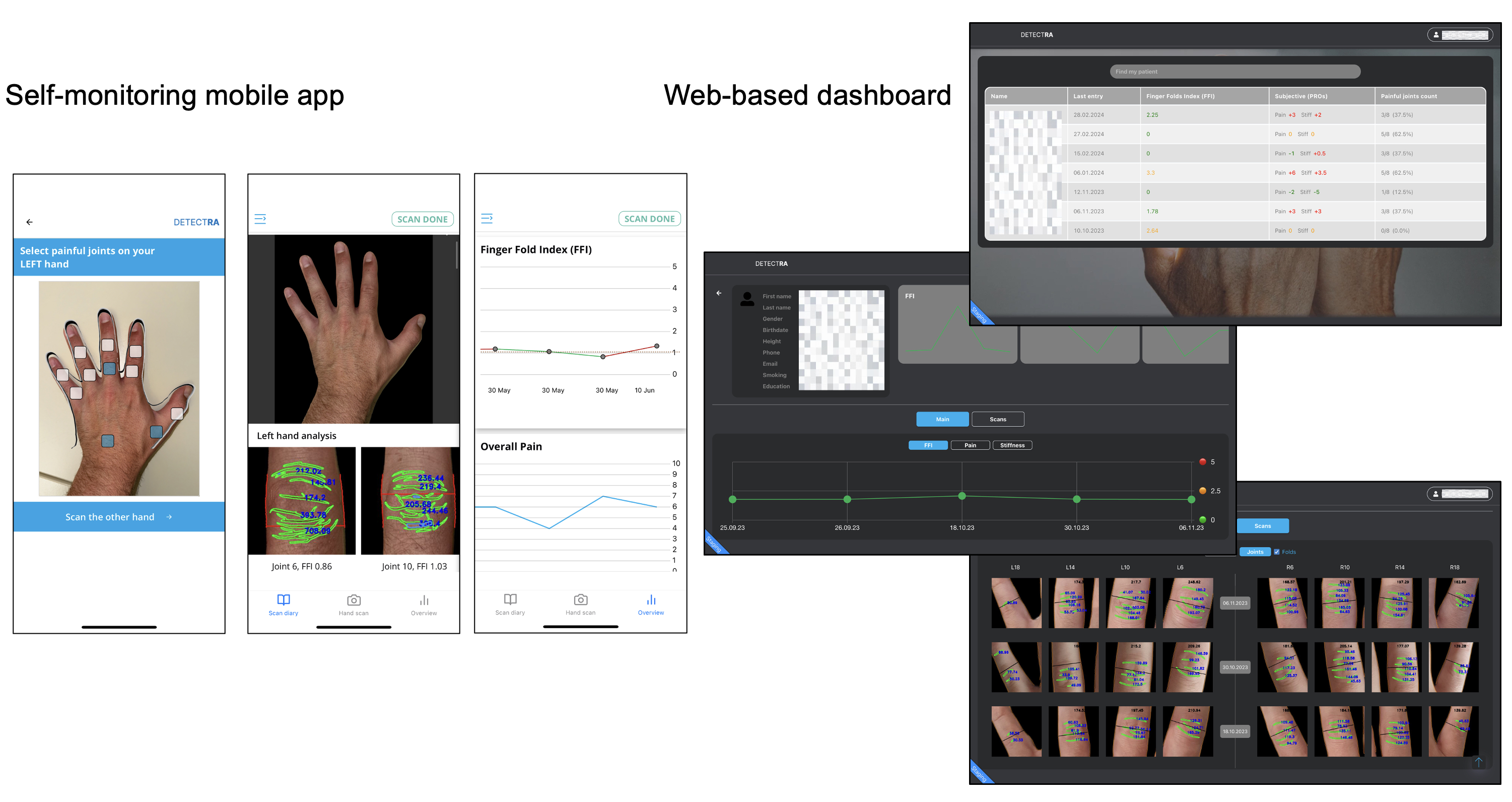Session Information
Session Type: Abstract Session
Session Time: 3:00PM-4:30PM
Background/Purpose: Rheumatoid arthritis (RA) care faces challenges due to a shortage of healthcare providers, an increasing patient population and the remote locations of many patients. Traditional assessment scores like CDAI and DAS28-CRP require in-person visits and invasive testing, making remote monitoring unfeasible. Subjective patient-reported outcomes (PROs) for pain, swelling, and stiffness are unreliable for remote assessments (Kalyoncu et al., 2009; Nikiphorou et al., 2016). Therefore, there is a need for a comprehensive remote monitoring system that combines PROs with objective, disease-specific biomarkers. For that reason, we developed DETECTRA, a remote patient monitoring system based on the combination of an objective digital biomarker for finger joint swelling (Finger Fold Index, FFI) and the collection of RA-specific PROs like stiffness and pain (Hügle et al., 2022). This system aims to evaluate the implementation of a comprehensive remote monitoring approach within clinical practice and throughout the RA patient journey, with the objective of enhancing patient care.
Methods: The DETECTRA system leverages the FFI and PROs within an RA remote monitoring platform. The FFI, derived from computer vision and convolutional neural network models, calculates joint swelling of Proximal Interphalangeal (PIP) joints from hand pictures taken by the patient’s phone. The system includes a self-monitoring mobile app for iOS and Android, allowing users to photograph their hands, select tender joints, and report stiffness and pain. A web-based dashboard for clinicians integrates these data as into an electronic medical record, providing a comprehensive view of patient progress. The prototype’s usability and ergonomics are currently being tested through patient and clinician feedback.
Results: The development phase let to the release of a functional prototype of DETECTRA (Figure 1). Initial testing with 8 RA patients showed the mobile app is user-friendly and efficient in data collection, with patients expressing high interest in regular use. They reported increased motivation from remote monitoring by their clinician and felt empowered in managing their disease. Feedback from rheumatologists and key opinion leaders in RA (n=10) highlighted the dashboard’s value in tracking patient data and visualizing hand images over time. Clinicians appreciated the increased granularity in patient follow-up, which they believe can enhance overall patient management and treatment response monitoring.
Conclusion: The development of remote monitoring platforms such as DETECTRA, that combine objective biomarkers like the FFI with disease-specific PROs, is essential for improving RA patient care. Such systems have the potential to address the challenges of healthcare provider shortages, growing patient populations and remote care needs. Our prototype is undergoing clinical and patient testing, with future research aimed at validating its effectiveness and optimizing integration into clinical practice.
To cite this abstract in AMA style:
Blanchard M, Koller C, Maglione J, Hermann P, Hügle T. Development of a Remote Patient Monitoring System Based on a Novel Digital Biomarker for Swelling in Rheumatoid Arthritis [abstract]. Arthritis Rheumatol. 2024; 76 (suppl 9). https://acrabstracts.org/abstract/development-of-a-remote-patient-monitoring-system-based-on-a-novel-digital-biomarker-for-swelling-in-rheumatoid-arthritis/. Accessed .« Back to ACR Convergence 2024
ACR Meeting Abstracts - https://acrabstracts.org/abstract/development-of-a-remote-patient-monitoring-system-based-on-a-novel-digital-biomarker-for-swelling-in-rheumatoid-arthritis/

